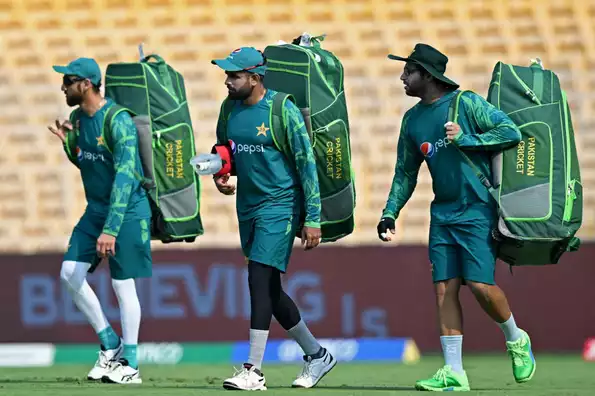Pakistan World Cup caravan has arrived in Chennai, however there are a few problems that need to be resolved right now. Examples of these include batting collapses, low percentage of sixes, high dot-ball percentage, costly returns with the new ball, inability to score runs through middle overs, and defensive errors.
They genuinely hope for a few positive outcomes right now, even though they would prefer to know the answers to their worries in the near future. Since the tournament is almost halfway over, their next two games, which are set to take place in the south Indian city, could ultimately determine their fate in the competition.
After two devastating losses, one in Australia and one in India, when they were not only defeated but utterly annihilated, the team led by Babar Azam is on their route to Chennai. Because of the results of those games and other matches they played during the tournament, they are currently outside of the top four in the points table. Imam-ul-Haq, the opening prayer for the Pakistani side, voiced hope that they can get past their current predicament and win two more games to complete the Chennai leg of their series.
Unfortunately, Pakistan’s batting failures were a factor in both of their losses. For their last five wickets in Australia and eight wickets in India, they had only managed to score 36 runs. Imam acknowledged that it’s concerning, but he also said that it’s time to motivate the players to perform better.
“In the last two games, we had outstanding starts. In the first twenty to twenty-five overs, we had a respectable run rate. That was when we just broke down. We discussed that. Stated differently, this is the moment to assist the players. We talked about potential enhancements and adjustments.
At the start of the Chennai leg, they will face Afghanistan, who are currently bottom of the league. Afghanistan might overtake Pakistan in the rankings with a significant victory. Spin is predicted to be important because this match will take place on the same field as Australia and India. Pakistan has been having trouble in this area both with the bat and the ball.
Pakistani spinners now hold the second-place ranking in the competition with an average of above 70. The opposition batsmen are able to form tactical alliances in the middle overs due to their batting speed, which is approximately 73 balls per wicket. Their three frontline choices aren’t particularly adept at turning the ball over. Moreover, Shadab Khan, who was benched for the previous game due to a sustained decline in form, may start again in place of Usama Mir on a pitch where his faster pace would be more advantageous.
Despite the challenges, Imam admitted that there isn’t much space for improvement at the World Cup. Put differently, I don’t believe we’ll get another chance to practice this time. The top up is all that matters; the rest of us are merely players in this competition. We just don’t have enough time, even if every guy prepares differently and we support their ability regardless of how they practise. We know, in fact, that the arena is moving.”
Rather, as a result of the joint efforts of Muhammad Nabi, Rashid Khan, and Mujeeb ur Rahman, Afghanistan has expanded throughout that period and has even turned into their most productive operating theatre. Imam, on the other hand, has written off that threat and is willing to put his faith in Pakistan’s latest triumphs against its Asian foes.
Needless to say, Afghanistan produces excellent spinners who do well in the middle overs. But at Hambantota, we had beaten them 3-0. Even there, the conditions were very spin-friendly. We’ll do all in our power to assist with that. In the end, you have to play the ball. You are not obliged to play bowler. Therefore, all you have to do is encourage your skills.”
Pakistan has also been quite concerned about the pacers’ ineffectiveness with the new ball, which was their main asset and the reason they topped the ICC rankings. They have given up 51 and 55 runs against Australia and Sri Lanka in the last nine overs, respectively, after playing excellently in the last overs. However, the deck was stacked against them before they could establish themselves, and their efforts in the last overs have only partially restored the lost momentum.
While Hasan Ali performed admirably in Naseem Shah’s absence, he is not as adept with the new ball. Shaheen Afridi, who recovered from an injury in April of this year, has also not played well, scoring 42.50 on average in the first ten overs.
“There have been many high-scoring matches this World Cup,” Imam stated, encouraging the bowlers to persevere. Not that we can’t make good use of it. In addition to our bowlers’ struggles, the opposition is scoring between 350 and 360. For example, yesterday’s score was 400.Because of the small venues and great pitches, bowlers have very little margin for error once the hitters are established.”
“Despite the circumstances, the state of affairs is intolerable. I anticipated they would score 420 or 430 in the most recent game, but our end bowlers and spinners played superbly, holding them at 360. Bowlers do have ups and downs occasionally, Shaheen for example.
Because of this, both Shaheen and our bowlers have played incredibly well in spurts. These are a few advantages. Because this competition comprises of back-to-back games, we try to ignore the disadvantages during the day and concentrate only on the benefits. When we bowl well that day, we must support this. In my opinion, none of these things are not taking place. Yes, everyone has bad days occasionally, but I think that’s something to be grateful for.

